Covid-19: Meet the contact tracers tracking coronavirus in NI
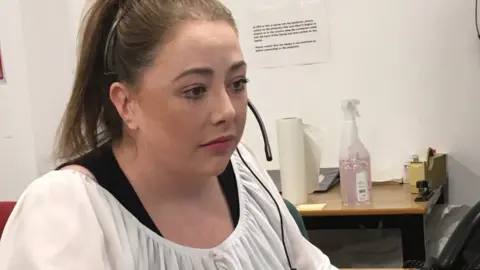 BBC
BBCContact tracing in Northern Ireland has identified more than 700 people who have been in contact with a positive case of coronavirus since the programme began.
Between the 19 May start date and 6 June, 480 people who had tested positive had been called and 721 contacts successfully traced.
There are currently 82 Public Health Agency (PHA) contact tracers, who come from a range of backgrounds.
A further 20 are being trained.
They include PHA nurses, health improvement staff, RQIA bank inspectors, nurses from the trusts and environmental health officers.
One nurse who swapped her scrubs for a headset is Emma Hudson - normally a staff nurse at the Ulster Hospital in Dundonald, she was deployed to the contact tracing programme two days a week.
'Many questions'
"I think the nursing background has benefitted doing the tracing role, because people have questions," she told BBC News NI.
"People like answers, and I think people are reassured to actually get a phone call to actually get to speak to someone about it."
Often they will already have let their close contacts know they are being tested, she said.
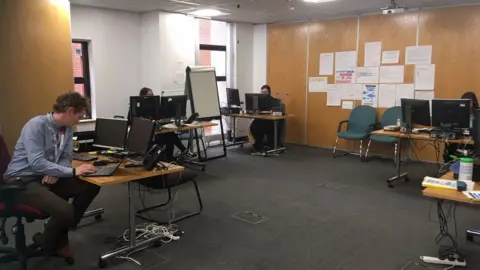
"Obviously, when we are calling close contacts of someone who's tested positive for coronavirus, because of confidentiality, we can't say who that person is, so we don't give out any of that information at all.
"All we do is say that they've been in contact with someone who's tested positive; this is when they experienced symptoms; or this is when they got their test.
"So we would ask you to isolate from a certain date, and your isolation would end on this date, so that they would have clear guidance on how long they need to isolate for.
"We don't ask for any other information from them. The most important thing that we need to get across is if you test positive or if you've been in close contact - you need to stay at home."
'Self-isolating advice'
Social distancing limits the number of contacts, which helps make Emma's job a little easier.
"If they are living by themselves and they have no close contacts that they can think of, it's fairly straightforward. We just give them advice about self-isolating for seven days and who to contact if they become unwell or worse in their symptoms.
"The difficulty would be if we call someone up and there's a lot of people in the household or there's a lot of people who they've been in close contact with. Then the conversation will be longer.
"We are calling from a withheld number, so you can understand why people maybe wouldn't be too keen to answer withheld numbers, so we introduce ourselves, say who we are.
"And then we go through the process of getting information on what symptoms they have, if any, when they started isolating."
The centre operates off positive test results recorded at one of the regional centres - the SSE Arena in Belfast, City of Derry rugby grounds, Craigavon MOT centre or St Angelo Airport outside Enniskillen.
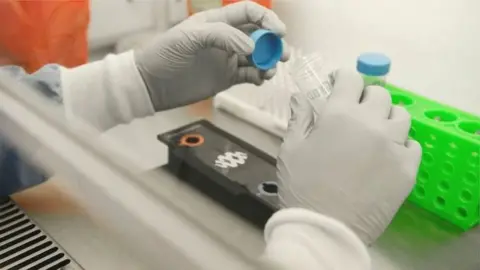 EPA
EPATests are booked online through the PHA website or by calling 119.
'Come forward'
If a person is unable to travel, a kit can be sent by courier, and there is also a mobile testing unit available.
But for public health doctors like Sinéad McGuinness, the important thing is for people to come forward when they have symptoms.
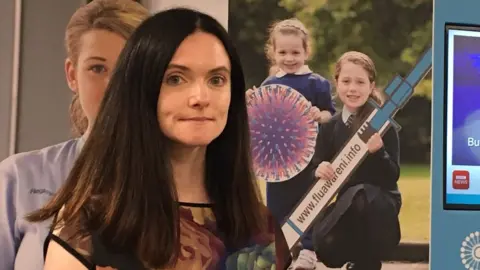
"Testing is available to anyone aged over five in Northern Ireland, so if you have one of the symptoms of coronavirus - a high temperature, a new continuous cough, or a change of or a loss of sense of taste or smell, then you can book a test," explained Dr McGuinness.
"All the tests are self-administered. The test is a swab and it goes at the back of your throat and then it goes into each nostril."
She added that the instructions provided at the test site on how to do this are "very useful".
"There's also useful videos and guidance on the PHA website that you might want to look at before you go," she said.
"You then package the test up again and hand it back to the staff at the site and a courier will bring it to the lab for testing."
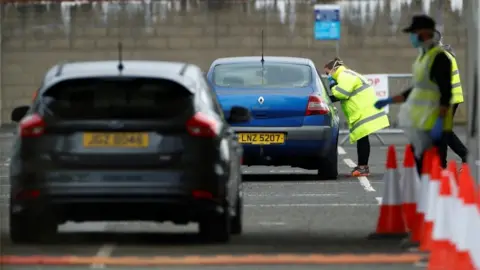 PA Media
PA MediaThe result arrives within 72 hours, with clinical staff on hand in the contact centre to help with advice.
Retired consultant Raymond Maw re-registered to help out when the pandemic hit.
"I wasn't needed for clinical duties, but then I was asked to be part of this team," he said.
"Our role is to supervise the contact tracers. They may need some help with some of the calls."
The clinical staff also help pinpoint potential clusters when a number of positive results are reported in a small area.
"If one of my colleagues identifies a number of cases in a particular place, such as a work place or in a particular household, I would look at the details of the case," said Dr Patrick McAleavey, a PHA doctor.
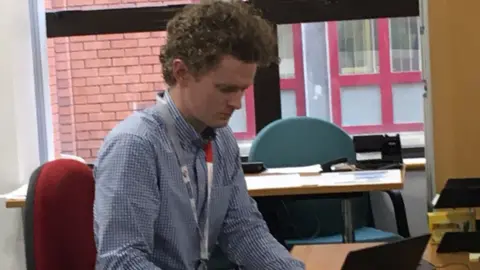
"Then I discuss it with my colleagues at the health protection service to decide if there are any other further actions required either by ourselves or our partners, such as the Health and Safety Executive.
"We've had a fantastic response from members of the public to our request for self-isolation and also providing the details of contacts."
Staff are expected to be in place for a year, with an option to extend.
It is estimated the programme will need 20 staff on shift at any time, as access to testing increases and the number of positive results recorded rises.
